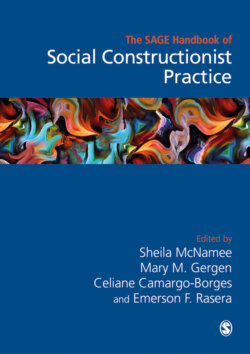Читать книгу The Sage Handbook of Social Constructionist Practice - Группа авторов - Страница 73
На сайте Литреса книга снята с продажи.
The Implications?
ОглавлениеAll of us scholars grapple with a deep addiction to the unsustainable systems within which we live and work – and a deep addiction also to the approbation, the scholarly rewards that recognize a narrow slice of inquiry. To varying degrees, we belong to communities that practice various levels of denial of just how much we exact a toll of suffering on weaker ones to maintain the status quo. If all of us are morally culpable, we also have the possibility to co-create the next system together, because we understand that we construct our social institutions. Knowledge systems for knowledge creation are not just academic. Transformation of academia is possible too!
Action research shows up in many contexts. The special issue on climate transformations mentioned above offers examples, e.g., by Daniel Morchain and his colleagues (2019). They share how transforming Oxfam's Vulnerability and Risk Assessment methodologies contributed to personal and institutional transformations. Drawing on projects in Malawi, Botswana and Namibia, they conclude that inclusive and representative participatory approaches can help shift narratives that people hold about their lives and work. By establishing platforms and processes for speaking ‘truth to power,’ participatory processes also allow marginal voices to be heard, which can uncover issues that have been previously unaddressed. Their ART research focused on building relationships and on narrowing power dynamics and differentials to enable the co-creation of solutions that are rooted in social justice. Their work is a powerful example of how to move beyond incremental toward transformational thinking and action, especially in relation to climate change adaptation.
This – and the many hundreds more action research cases – share principles of not remaining distant from the object of study, working within a conscious relational space, broadening perspectives and producing results together. Future and past are treated as part of the present moment. To ask ‘how do I do action research’ is similar to asking ‘how do I cook'? There is no simple answer, nor is a conceptual description all that helpful, especially not one without pictures of the dishes. By this I imply that action research is a process and takes various cultural forms across fields of endeavor and scholarly disciplines. And as with cooking there is a range, from simple potatoes to fiesta, and so action research too can involve a few or many thousands. As Gustavsen (2014) points out, there cannot be universality but there is potential for proliferating social learning if the findings are brought to a next group of stakeholders.
The wary newcomer may see this as off-putting and amorphous in comparison to the controlled process of conventional science. Still there are key ingredients or principles (Bradbury and AR+ Associates, see ActionResearchPlus.com); as long as you make sure you are not alone nor follow an expert's recipe to the letter. Along with stakeholders, may the ART force be with you!
